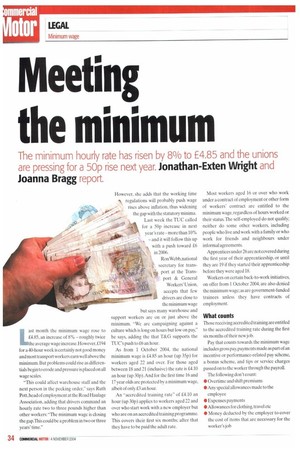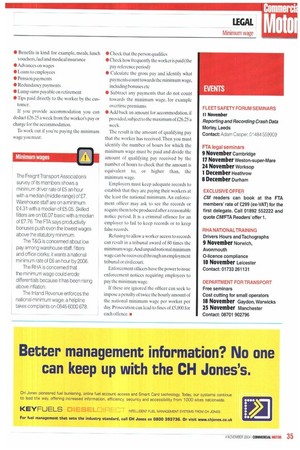Meeting the minim
Page 34

Page 35

If you've noticed an error in this article please click here to report it so we can fix it.
The minimum hourly rate has risen by 8% to £4.85 and the unions are pressing for a 50p rise next year. Jonathan-Exten Wright and Joanna Bragg report.
Last month the minimum wage rose to £4.85, an increase of 8% roughly twice the average wage increase. However,£194 for a 40-hour week is certainly not good money and most transport workers earn well above the minimum. But problems could rise as differentials ben to erode and pressure is placed on all wage scales.
"This could affect warehouse staff and the next person in the pecking order," says Ruth Pott,head of employment at the Road Haulage Association, adding that drivers command an hourly rate two to three pounds higher than other workers: -The minimum wage is closing the gap. This could be a problem in two or three years' time. However, she adds that the working time regulations will probably push wage rises above inflation, thus widening the gap with the statutory minima. Last week the TUC called for a 50p increase in next year's rate -more than 10% and it will follow this up -, with a push toward £6 in 2006.
Ron Webb,national secretary for transport at the Transport & General Workers' Union, accepts that few drivers are close to the minimum wage but says many warehouse and support workers are on or just above the minimum. We are campaigning against a culture which is long on hours but low on pay," he says, adding the that T&G supports the TUC's push to £6 an hour.
As from 1 October 2004, the national minimum wage is £4.85 an hour (up 35p) for workers aged 22 and over. For those aged between 18 and 21 (inclusive) the rate is £4.10 an hour (up 30p). And for the first time 16 and 17 year olds are protected by a minimum wage, albeit of only £3 an hour.
An -accredited training rate" of £4.10 an hour (up 30p) applies to workers aged 22 and over who start work with a new employer but who are on an accredited training programme. This covers their first six months; after that they have to be paid the adult rate. Most workers aged 16 or over who work under a contract of employment or other form of workers' contract are entitled to the minimum wage, regardless of hours worked or their status. The self-employed do not qualify; neither do some other workers. including people who live and work with a family or who work for friends and neighbours under informal agreements.
Apprentices under 26 are not covered during the first year of their apprenticeship, or until they are 19 if they started their apprenticeship before they were aged 18.
Workers on certain back-to-work initiatives, on offer from 1 October 2004, are also denied the minimum wage; as are government-funded trainees unless they have contracts of employment.
What counts
Those receiving accredited training are entitled to the accredited training rate during the first six months of their new job.
Pay that counts towards the minimum wage includes gross pay,payments made as part of an incentive or performance-related pay scheme, a bonus scheme, and tips or service charges passed on to the worker through the payroll.
The following don't count: • Overtime and shift premiums • Any special allowances made to the employee • Expenses payments *Allowances for clothing, travel etc • Money deducted by the employer to cover the cost of items that are necessary for the worker's job The Freight Transport Associations survey of its members shows a minimum driver rate of £5 an hour with a median (middle range) of £7. Warehouse staff are on a minimum 24.31 with a median of £5.05. Skilled fitters are on £6.07 basic with a median of 27.76. The FTA says productivity bonuses push even the lowest wages above the statutory minimum.
The T&G is concerned about low pay among warehouse staff, fitters and off ice clerks; it wants a national minimum rate of £6 an hour by 2006.
The RHA is concerned that the minimum wage could erode differentials because it has been rising above inflation.
The Inland Revenue enforces the national minimum wage; a helpline takes complaints on 0845 6000 678. • Check that the person qualifies • Check how frequently the worker is paid (the pay reference period) • Calculate the gross pay and identify what payments count towards the minimum wage, including bonuses etc • Subtract any payments that do not count towards the minimum wage, for example overtime premiums • Add back an amount for accommodation, if provided,subject to the maximum of £26.25 a week.
The result is the amount of qualifying pay that the worker has received. Then you must identify the number of hours for which the minimum wage must he paid and divide the amount of qualifying pay received by the number of hours to check that the amount is equivalent to, or higher than, the minimum wage.
Employers must keep adequate records to establish that they are paying their workers at the least the national minimum. An enforcement officer may ask to see the records or require them to be produced after a reasonable notice period. It is a criminal offence for an employer to fail to keep records or to keep false records.
Refusing to allow a worker access to records can result in a tribunal award of 80 times the minim urn wage.And unpaid national minimum wage can be recovered through an employment tribunal or civil court.
Enforcement officers have the power to issue enforcement notices requiring employers to pay the minimum wage.
If these are ignored the officer can seek to impose a penalty of twice the hourly amount of the national minimum wage per worker per day Prosecution can lead to fines off5,000 for each offence. •






























































































































































































